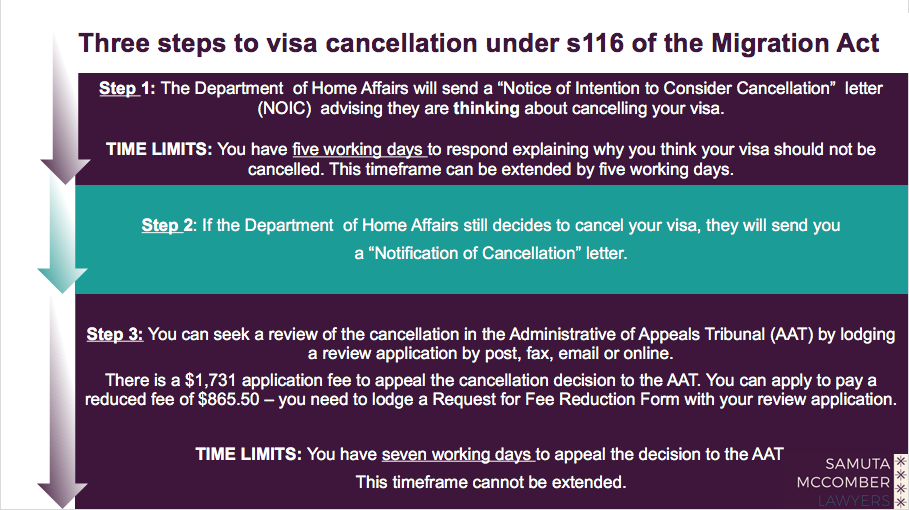We recently began acting for a student visa holder whose visa was cancelled under s 116(1)(e) of the Migration Act 1958 on the basis that he had been charged with a single offence involving non-domestic personal violence.
A delegate of the Minister considered that their power to cancel our client’s visa had been enlivened as they were satisfied that our client’s ongoing presence in Australia was, or might have been, a risk to the health and safety of the alleged victim the alleged offence. Further, the delegate considered that the power to cancel our client’s visa should be exercised on the basis that the possible risk posed to the alleged victim outweighed the reasons why our client’s visa should not be cancelled.
This was despite the following:
1. our client had not been found guilty of the alleged offence, he had only been charged by the police and indicated that he intended to contest the charge (i.e. plead not guilty);
2. our client had not previously been convicted of, or charged with, any criminal offence in Australia or any other country;
3. our client had been released on bail by the police on his own undertaking (that is, the police did not consider our client such a risk that they required our client to apply to a Court for bail);
4. our client had complied with the condition of his bail not to have any contact with the alleged victim from the time of the offence through to the time of his cancellation;
5. the Department had no evidence of any probative value that the alleged offence had in fact been committed (only the mere fact that our client had been charged with the offence by police);
6. the cancellation of our client’s visa would mean that he would be unable to complete the degree and lose the benefit of more than $60,000.00 in course fees paid by his family;
7. the cancellation would also render our client ineligible to be granted any temporary visa for 3 years after the date of cancellation.
After receiving the cancellation decision our client applied to the Administrative Appeals Tribunal for review of the decision and applied to the Department for a bridging visa so that he could attempt to regularise his immigration status. Thankfully he was able to find the money pay the Tribunal’s $882.00 reduced filing fee within the seven working day period for applying for review.
Barely one week after the Minister’s delegate decided to cancel our client’s visa, a Court dismissed the charge brought against our client on the basis that he had no case to answer. However, our client’s visa will remain cancelled until the Administrative Appeals Tribunal determines our client’s application for review (which could take months).
Thankfully, the Department of Home Affairs, less than 10 days after being of the view that our client’s ongoing presence in Australia presented such a risk to the community that his visa should be cancelled, granted our client a bridging visa authorising his continued presence in the Australian community until the AAT determines his application for review. Given that our client has never been convicted of any criminal offence, and that the sole charge that was brought against him was dismissed by a Court, we expect that the Tribunal will have no difficulties in setting aside the Tribunal’s cancellation decision (effectively reinstating our client’s student visa).
While this particular client should have things turn out okay (notwithstanding the additional stress, resources and inconvenience of having to go through a visa cancellation and Tribunal review process), this case does illustrate some of the serious risks that the Department’s approach to cancellations under s 116(1)(e) presents to non-citizens.
First of all, this case illustrates that a delegate of the Minister will have no difficulty satisfying themselves that a non-citizen’s ongoing presence in Australia poses a risk to the community or an individual if the non-citizen has merely been charged with a criminal offence involving violence, even in circumstances where the non-citizen has otherwise not ever been charged or convicted of any criminal offence in Australia or abroad.
Secondly, delegates are perfectly happy to rely on the mere fact that police have charged a non-citizen with an offence as the sole basis for forming a satisfaction that the non-citizen presents a risk. This approach fundamentally undermines the system of criminal justice that our society has refined over decades, if not centuries. It is not the task of police to determine with finality whether a person has committed an offence or not. That task is reserved for the Courts. If police knew that their decision to charge a non-citizen with an offence would be used as the sole basis for cancelling that non-citizen’s visa, they may well take a more conservative approach to deciding whether to charge the non-citizen. I have sufficient faith in our criminal justice system to believe that police should not be more conservative in their decisions to charge people with offences merely because an employee of the Department of Home Affairs might rely on that decision as the sole basis to ruin a non-citizen’s life.
Thirdly, this case demonstrates that even where the potential risk of harm can only be put at minimal, some delegates will exercise the cancellation power notwithstanding the significant prejudice that would be caused to a non-citizen by the cancellation. It appears that some delegates are of the view that once they are satisfied that a risk might exist, no amount of prejudice caused to a non-citizen by a cancellation is enough for them to think that their visa should not be cancelled.
This case also demonstrates that the ability to correct defective administrative decision-making is wholly dependent on a non-citizen’s ability to raise $882.00 within seven working days of being notified of the cancellation decision. While this client was able to raise that money, clients who receive cancellation decisions while being held in prison on remand (and many who are living in the community) have an extremely limited ability to pay that sum of money within such a short time (on top of their limited ability to file applications in the Tribunal within the same timeframe). In the case of those persons held on remand, who literally cannot themselves pay the filing fee, their ability to exercise their statutorily prescribed right to review the cancellation decision is wholly dependent on the ability and willingness of their friends and family on the outside to get the money together (this includes many New Zealand citizens who have lived in Australia for decades and since infancy).
Fifthly, this case demonstrates that police do not always ‘get it right’. I am hesitant to put it that way, because I don’t think it is the job of police to get it right every time they make a decision as to whether to charge a person with an offence. I don’t think any reasonable person thinks that every competent police officer performing their duties to the best of their ability only ever charges guilty people. Nor do I think it is desirable to hold police officers to that standard. Such a belief would fundamentally undermine the system of justice our society has developed over a long time. I have heard a lot of good arguments for why police officers should be more liberal (i.e. more willing to bring charges) where some uncertainty exists (although, those arguments tend to fade in persuasiveness when the prospect of visa cancellation predicated on a decision to charge is introduced to the mix). Many defendants are found not guilty, others have their charges dismissed and many charges are not pursued by the police and/or prosecutors.
We have spoken to many non-citizens whose visas were cancelled under s 116(1)(e) on the basis of outstanding charges only for those charges to have been dropped or dismissed. Unfortunately they were unable to file an application in the AAT (and pay the associated fee) within time (often because of the restrictions of being detained on remand) and now have no meaningful avenue to return to living in the Australian community despite never having committed, or been charged with, any criminal offence. In the case of New Zealand citizens, this can mean exclusion from the country that they have lived in for decades and since infancy despite having committed no criminal offence.
It is curious that the Minister for Immigration, Citizenship and Multicultural Affairs is also charged with protecting Australia’s cultural and social history and institutions. I, generally, have a great deal of respect of the system of law that our country inherited from the British empire and has refined since. It is a system of law that, historically, has tended to develop to protect people within society from arbitrary and capricious exercises of government power (or Royal power as it was centuries ago). However, the approach the Minister’s delegates take to exercising their powers under s 116(1)(e) often have the effect of undermining the system of criminal justice our society has developed, and leaves non-citizens who are later proven to have committed no criminal offences with no recourse to correct the damage done to their lives.


